Story of the Week... Editorial of the Week... Toon of the Week... Quote of the Week... SkS in the News... Scholarly Paper of Note... Coming Soon on SkS... Climate Feedback Reviews... SkS Week in Review... Poster of the Week...
Story of the Week...
Gov. Brown says fallout from Trump quitting Paris accord is 'far more serious than anyone is saying'
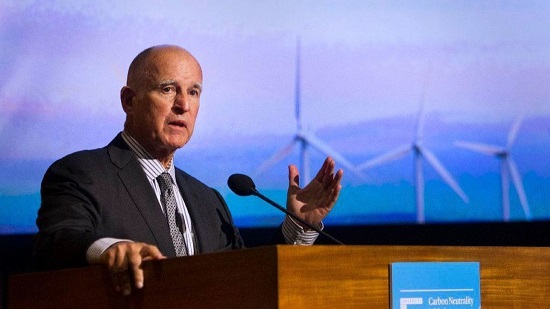
California Gov. Jerry Brown addresses the University of California Carbon and Climate Neutrality Summit in San Diego. (Howard Lipin / San Diego Union-Tribune)
His promised coal renaissance sputtered. Rollbacks of environmental protections are tangled in court. Even automakers aren’t on board for his push toward heavier-polluting cars.
But even so, a year after President Trump pulled out of the landmark Paris accord on climate change, the struggle to contain global warming has grown considerably more complicated without the prodding and encouragement once provided by the U.S. government.
And though many in the climate movement hope progress toward cutting emissions can continue despite Trump’s retreat, there are growing doubts about reaching the Paris agreement’s goal of limiting global warming to 2 degrees Celsius, if Washington does not re-engage soon.
In an interview, Gov. Jerry Brown acknowledged the hope felt by many climate activists because of efforts from states like his and by private companies. But he also said the world is only just beginning to feel the environmental harm inflicted by the Trump administration.
Gov. Brown says fallout from Trump quitting Paris accord is 'far more serious than anyone is saying' by Evan Halper, Los Angeles Times, June 1, 2018
Editorial of the Week...
Hope in the Era of Trump’s Climate Foolishness
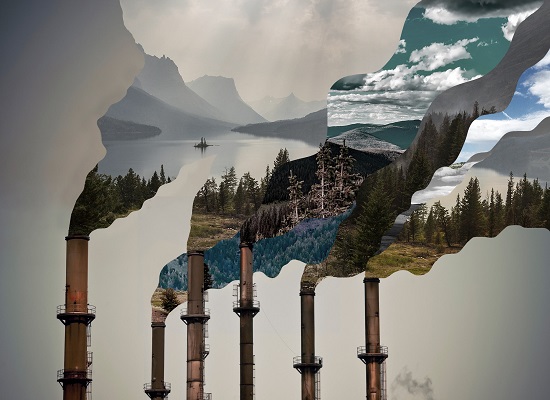
Credit: Illustration by Matthieu Bourel; Photograph by Getty Images
Concluding paragraph...
In an ideal world, Americans would have a federal government that, as it has in the past, provides investment in new technologies, in research and development and in energy infrastructure. Instead, we are saddled with an administration that is preparing to force power companies to keep dirty and inefficient coal-burning power plants operating on the pretext that they are needed to protect national security. Until that changes, the voices of all those governors, mayors, corporate leaders and others who, after Mr. Trump’s withdrawal from the Paris agreement, proclaimed, “We AreStill In,” deserve praise and support.
Hope in the Era of Trump’s Climate Foolishness, Editorial Board, New York Times, June 1, 2018
Toon of the Week...
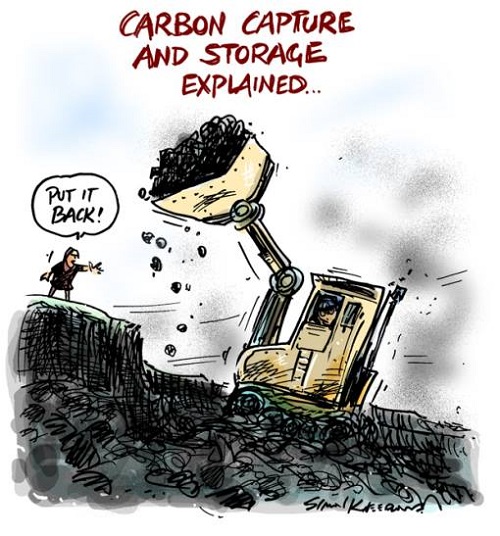
Quote of the Week...
“He has set in motion initiatives that will cause damage,” (CA Gov Jerry) Brown said, comparing the planet under Trump’s climate policies to a person who has just fallen from the top of the Empire State Building. “You are falling down four stories, but have 80 to go,” he said. “Maybe you are not damaged yet, but it is certain you will die.”
The governor said his overriding concern is that global progress has stalled. “This is real,” Brown said. “It is far more serious than anybody is saying.”
Gov. Brown says fallout from Trump quitting Paris accord is 'far more serious than anyone is saying' by Evan Halper, Los Angeles Times, June 1, 2018
SkS in the News...
Michael Svoboda concludes his article, Truthsquading: Books and reports on the denial and obstruction of climate science (Yale Climate Connections, May 31, 2018) with the following:
Three Reports from Skeptical Science
A pivotal figure in the effort to counter global warming skepticism is John Cook, who started the Skeptical Science website in 2007, while still a student at the University of Queensland in Australia. Since then Cook has (co)authored reports to alert readers to the manufactured arguments they’re likely to encounter when discussing climate change in public. Two – The Scientific Guide to Global Warming Skepticsm (2010) and The Debunking Handbook (2011) – can be downloaded from the Skeptical Science website. The third, The Consensus Handbook (2018), is available from the Center for Climate Change Communication at George Mason University, where John Cook now works as a research assistant professor.
Scholarly Paper of Note...
The underlying premise of this paper is that repetition of a narrow narrative that focuses exclusively on the impacts of climate change leaves the public with an overall sense of powerlessness. The paper focuses on five years of national media coverage of climate change in the U.S. Arctic, specifically stories about communities facing coastal erosion and relocation, to argue for journalism that provides a more representative view of the challenges posed by a warming climate. Such reporting would also include responses and innovations, and increase pressure on policymakers to act, rather than offering excuses for inaction.
Doom and Gloom: The Role of the Media in Public Disengagement on Climate Change by Elizabeth Arnold*, Harvard Kennedy School, May 29, 2018
*Joan Shorenstein Fellow, Spring 2018, and Associate Professor of Journalism, University of Alaska
Coming Soon on SkS...
- The attacks against solar power and EVs are ramping up (Dana)
- New Video: Hot Ocean, Hurricanes, Houston, and Harvey (greenman)
- Climate focused blogs around the world (BaerbelW)
- Guest Post (John Abraham)
- New research this week (Ari)
- 2017 SkS Weekly Climate Change & Global Warming News Roundup #23 (John Hartz)
- 2017 SkS Weekly Climate Change & Global Warming Digest #23 (John Hartz)
Climate Feedback Reviews...
In a Warming West, the Rio Grande Is Drying Up
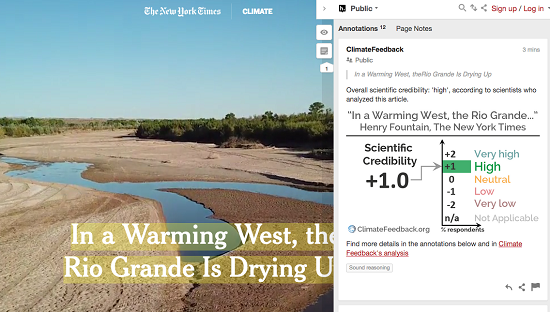
Climate Feedback asked a team of scientists to review the article, In a Warming West, the Rio Grande Is Drying Up by Henry Fountain, Climate, New York Times, May 24, 2018
Two scientists analyzed the article and estimate its overall scientific credibility to be 'high'.
A majority of reviewers tagged the article as: Sound reasoning
Review Summary
This article in The New York Times discusses water supply issues along the Rio Grande in New Mexico, and the projected impacts of climate change.
Scientists who reviewed the article generally found it to be an accurate description of research on this topic. However, they note that it’s important to remember that precipitation in this region can naturally vary on timescales longer than just one year to the next. Even changes from one decade to the next should be considered carefully in the context of variability—and water supply risks depend on both human-caused trends and that natural variability.
New York Times story accurately describes Rio Grande’s climate context, Edited by Scott Johnson, Climate Feedback, May 31, 2018
SkS Week in Review...
- 2018 SkS Weekly Climate Change & Global Warming News Roundup #22 by John Hartz
- New research, May 21-27, 2018 by Ari Jokimäki
- Restricting global warming to 1.5C could ‘halve’ risk of biodiversity loss by Daisy Dunne (Carbon Brief)
- Melting Arctic sends a message: Climate change is here in a big way by John Abraham (Climate Consensus - the 97%, Environment, Guardian)
- Trump administration refuses to consider that 97% of climate scientists could be right by Dana Nuccitelli (Climate Consensus - the 97%, Environment, Guardian)
- 2018 Hurricane Season: A Preview by greenman3610 (Climate Denial Crock of the Week with Peter Sinclair)
- 2018 SkS Weekly Climate Change & Global Warming Digest #21 by John Hartz
Poster of the Week...
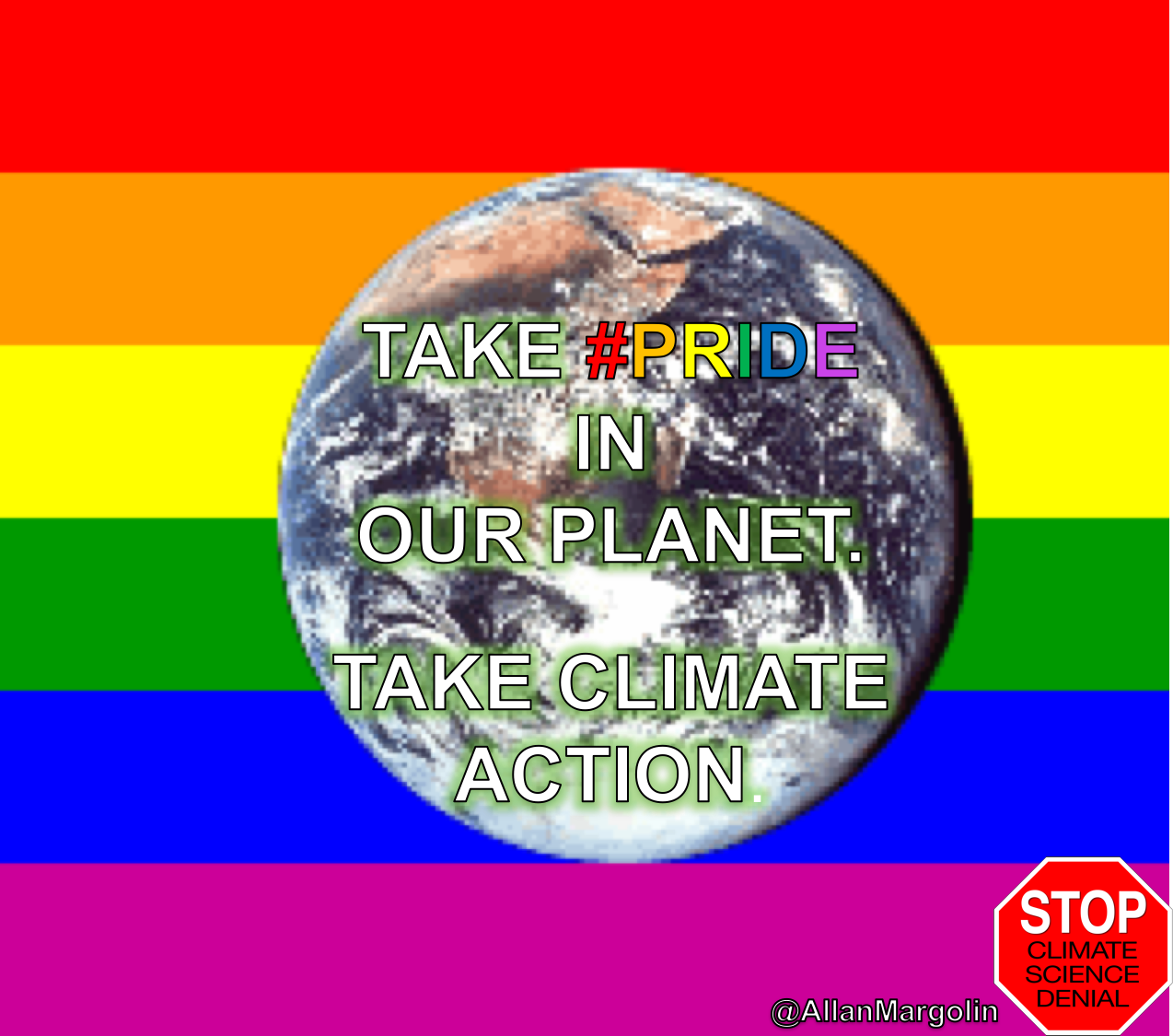
from Skeptical Science
via IFTTT